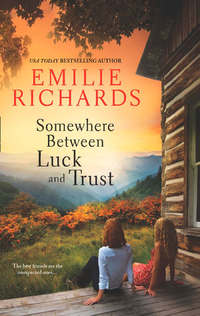
Полная версия
Endless Chain
There was little call for mariachi bands in Shenandoah County.
Christine had promised to find her way to the church about dinnertime, when the fiesta would just be getting into swing. At four Sam rolled up his sleeves, and by six he stepped back and took a long look at what they had accomplished. He loved being outdoors, having open space around him, the fresh breeze tickling his skin. He was going to enjoy the evening.
“I’m impressed,” he told the president of his board of deacons, Gayle Fortman, an attractive single mother of three teenaged boys. “Now if the rain just holds off...”
“It’s supposed to.” Gayle’s short blond hair stuck out in a hundred directions, and she had a streak of dirt on one cheek. She had been on ladders for hours stringing lights. Two of her sons had helped and were now wheeling clumps of grass to the church compost bin.
“People will have a good time,” he promised. “Even if we don’t raise a lot of money, this gives everyone a look at what we’ve done to the house. Good feelings will be worth a lot down the line.”
“Not everyone’s happy with this project.”
He knew she wasn’t talking about tonight’s fundraiser. “You’ve been getting calls?”
“Sam, everything you do pisses off somebody. I need a hotline.”
Sam supposed three rambunctious boys taught a mother not to beat around the bush.
“Most of the calls are from perpetual malcontents who weren’t happy we hired you in the first place,” she continued, when he didn’t defend himself. “I suppose they would call if Jesus was the pastor, too.”
“Probably more often. At least I don’t turn water into wine.”
She had a deep, satisfying laugh. “A lot of people are coming tonight. The summer’s ending. This is the final social event before Labor Day. For a last-minute, middle-of-the-week celebration, we did good, huh?”
“It’s a testament to the church’s well-being that when we decided to hold a fundraiser, there were few dates not booked for something else.”
“You do keep things moving. I’ll give you that.”
He took that as a compliment, although it was questionable. “I’ve had four interviews for a new sexton. I’ll be choosing by the end of the week.”
“Good. Marie Watson called to tell me the women’s bathroom was not clean enough to suit her. Twice.”
“She’s only been to church twice all summer.”
“Well, we know where she spent her time when she was here.”
One of Gayle’s sons called her away, and she lifted a hand in farewell. “I’m going home for a shower, but I’ll be back in half an hour. If the caterer doesn’t show up in fifteen minutes, call me?”
He watched her go and wished he had four dozen more just like her in the congregation.
The caterers did arrive, and competently erected grills and serving tables before they began to set out covered bowls of salsas, guacamole and sour cream. The Sunday school superintendent arrived with the largest donkey piñata Sam had ever seen and strung it from an appropriate tree limb far away from where the food would be served.
He slipped home for a quick shower, too, and changed into a colorful shirt and dark pants.
He beat Christine to the party by close to an hour. The mariachi band, dressed in full black-and-gold regalia, was playing a lively version of “La Bamba” when she arrived in an off-the-shoulder white dress cinched at the waist with a wide silver belt.
“The fiesta has begun,” she said, kissing his cheek, then wiping off her lipstick. “And they’re actually in tune.”
She sounded surprised, and he couldn’t chide her. Considering what the committee was paying the band, he had expected the men to take turns strumming one guitar. Instead, seven members had arrived, complete with elaborate costumes and expensive instruments.
“They’re great,” Sam said. “You ought to hear them sing ‘Malaguena Salerosa.’” He hummed a few bars.
“Better them than you.”
People began to come forward to be introduced to Christine. He did his part, and watched her chat with his parishioners and those of the surrounding churches who were helping with La Casa. He had seen Christine in action a thousand times and knew how much more energy she was capable of expending, if she thought it mattered. She was polite tonight, even friendly, but he knew—even if no one else did—that her heart wasn’t in it.
“Fajitas, Sam?” she said, when they were temporarily alone again. “They’re serving fajitas?” She gave a low laugh.
“I’ve eaten four. Come on, I’ll load up your plate.”
“I’ll just take a pass. That’s a week’s worth of calories on a tortilla. Cheese, sour cream, guacamole.” She rolled her lovely green eyes.
“It’s a party, Chrissy. Worth a few fat grams.”
“Plastic lanterns and piñatas do not a party make, sweetie. There’s nothing to drink, is there?”
“Not with children present.” He felt a flash of annoyance that she would make a point of that. They had never served liquor at family functions at The Savior’s Church, either, a fact she was well aware of, since she was the headmistress of the private school associated with that congregation.
She made a face. “I’ll just go see what I can find that’s safe to swallow. I’ll catch you later.”
He didn’t volunteer to go with her. Instead, he wandered over to the tree where the donkey piñata hung. Two dozen children stood in a wide circle watching a blindfolded second-grader swing a plastic bat in the donkey’s general direction.
He was squatting on the ground, surrounded by four elementary schoolgirls who had just finished explaining what they would do with the bounty if they opened the piñata, when someone spoke above him.
“We can safely say it will take dynamite to crack that facade.”
Sam stood to find a cleaner, happier Gayle. “We’re preparing them for a life of frustration.”
“In ten minutes someone will take a chain saw to that thing and be done with it. The kids won’t care, as long as they get the candy and toys.”
“I’ve had a load of compliments on what we’ve done with the house, and a good number of checks accompanied them.”
“Terrific.”
“Sam!”
Over the strains of “Cielito Lindo,” Sam looked for the source of the shout and finally spied one of the deacons, a man in his late seventies named Early Meeks, coming from the direction of the church. Early was tall and completely bald. He drew attention away from the hair he lacked with brightly colored neckties and suspenders. He was a favorite of the Sunday school children, who appreciated his flair for comedy.
Early looked anything but comic now. Sam excused himself and went to meet him halfway.
“What’s up?” Sam asked.
“We have a situation in the social hall.”
“Situation?”
“George Jenkins is here.”
George’s presence surprised Sam. Jenkins was the member of the board of deacons least likely to go along with any good idea. He had opposed La Casa Amarilla from the first, expounding on the need to “pull together” as a congregation, which was George’s own code for “keeping outsiders away.” He had been overruled on La Casa, as he was usually overruled, a fact that made him even more determined to make trouble for Sam. Sam gave silent thanks every time he remembered that George was serving his final months of a five-year term.
“His son was here earlier today,” Sam said. “There was another situation during that little visit.”
“Leon never really struck me as a chip off the old block.” Early nodded toward the church. “But you’d better come quick. George is making threats. We’re trying to keep him out of sight.”
“We?”
As they strode toward the church, Early explained that several partygoers had removed George to the social hall. “I was coming for the party, too. I heard a commotion just inside the front door and went to check. Apparently George doesn’t know the party is elsewhere.” He hesitated. “Actually, George probably doesn’t know much of anything right now. He’s had more than a few drinks tonight.”
Sam was grateful the men had stopped George before he destroyed the good spirit at the fiesta and made more of a fool of himself in the process.
“Maybe if he has a chance to insult me he’ll calm down and we can get him home. How did he get here?”
“His car’s in the lot.”
“He’s lucky he didn’t kill somebody on the way over. They’re lucky.”
“We won’t let him drive home.”
Sam briefly considered calling the sheriff and having George removed from the premises, but the temptation passed quickly. There were better ways to deal with George, both for his sake and that of the church.
They reached the building and entered through a side door. When it closed behind him, Sam could no longer hear the band or the happy squeals of children. They turned down several corridors, ending up in the large room where most social events were held. Sam saw George in the corner by the door, flanked by the other men Early had mentioned. George, in his forties, was not aging well. He had coarse, bulldog features, a perpetual scowl, and a physique that was more out-of-shape wrestler than boxer.
Everyone but George looked uncomfortable. George looked furious.
Sam wasted no time reaching the others. The other men stepped away, leaving him to face the angry man.
“What’s going on, George?” Sam kept his tone carefully neutral.
“You’re...what’s goin’ on, preacher.”
Early had been right. Jenkins was clearly drunk. His words were slurred, his face flushed, and his eyes were not quite focused.
With effort, Sam remained polite. “There’s probably a better time and place to explore our differences. Why don’t I come to your house tomorrow, and we can talk about this all you want?”
“You...’umiliated my boy! Right in front of...of his frien’s...and those damn quilters....”
Sam had guessed this visit was about Leon. He wondered how much of the story the boy had told his father and what his version had sounded like.
Sam explained. “Leon tried to take a sledgehammer to the new sign. I stopped him and sent him home. That’s about it for the facts.”
George took a step closer and stuck his finger in the air near Sam’s nose. “You had no right!”
“George, I was trying to keep the sheriff out of it.”
“I’m gonna get you fired. You see...if I don’t.”
Sam hoped that was all the man needed to say. He saw no point in listening to more. “Why don’t you go home now? One of your friends will drive you. We’ll talk tomorrow.”
Sam started to turn away, a mistake he only realized when he heard George’s angry grunt. He whirled back just in time to see a fist coming directly at his face.
Sam was a coal miner’s son. He had spent his childhood years in a Pennsylvania coal patch defending a skinny younger brother from the sons of other coal miners. He did what came naturally. Lifting one arm, he blocked George’s punch, stepping sideways as he did. George, off balance to begin with, stumbled forward and fell to the floor at Sam’s feet.
Everyone stared. George lay as still as a corpse.
“He’s breathing,” Early said at last.
Sam felt only a touch of remorse. He had not punched Jenkins, only blocked his poorly aimed attack. He squatted and put his hand on the man’s neck. Jenkins’s pulse was strong and steady.
“Would that be a new version of turning the other cheek, pastor?” Early asked.
* * *
Elisa waved goodbye to the neighbor who had dropped her off at the church for the evening. She had promised to return when Elisa finished, despite Elisa’s assurances it wasn’t necessary. The Latino families at the park watched out for each other. During her months in residence, Elisa had done her share of favors for some of the young mothers, and the favors had been returned in a number of ways.
The night had turned cooler, and despite the afternoon storm, the humidity seemed to be dropping. She could hear music playing and wondered if her ears deceived her. Someone was singing in Spanish.
“Miss?”
Her head shot up, and she gazed in the direction the voice had come from. A young man—all too familiar—materialized from the deepening shadows at the front of the church.
She took a step backward. “What do you want?”
“Please...” He put his hands out, palms up, in supplication. “I—I’m sorry about, you know, that thing with the sign.”
“Were you waiting here just to tell me that?”
Leon Jenkins—now she remembered his name—shoved his hands in the pockets of baggy jeans. “I—you’ve got to help me.”
“I doubt I have to do anything.” She stepped forward to make up for the ground she’d lost. Anger shot through her as she remembered how vulnerable she’d felt when he’d stood in front of her with a sledgehammer. “And unless you’re really not very smart, you realize there are people nearby, yes? People who will come if I scream.”
“Don’t scream!” He looked around. “I mean, there’s no reason to scream. God, that will make things a whole lot worse.”
“I doubt your God has a thing to do with this. Maybe you ought to leave.”
“But I can’t! It’s my dad. He’s inside. And, well, somebody’s got to help me get him outside so I can take him home.”
She had no idea what he was talking about, and her expression must have said so.
“My dad, he’s, you know, mad at Reverend Sam. Real mad. Furious. I came home all wet and, like, soaked from that walk. And I had to tell him what happened. And I didn’t blame anybody. I told him it was just me being stupid.”
For the first time she noticed a bruise on his cheek. “He hit you?”
“He never hits me. I...tripped.”
She would just bet he’d tripped. Right into his father’s fist. She was beginning to feel sorry for the boy, and sorrier for falling prey to pity.
“Why does somebody need to get your dad and bring him outside?”
“Because he’s drunk, that’s why! And if I go in there by myself...”
Good old dad would hit him again. She saw the fear, and, worse, she saw the love. The boy was worried about his father’s safety.
“Leon—that’s your name, yes?”
He nodded.
“I don’t see what I can do about this.”
“Somebody’s got to do something.”
“I can go find the minister. Maybe Sam will know what to do.”
“No, he hates Reverend Sam. He really hates him. That’s why he came. He says he’s going to find him and show him what he thinks of him, once and for all.”
She wondered if the boy dealt with this problem often. It explained a lot about the way he had behaved that morning.
She debated her role. She had no reason to get involved except one. She liked teenaged boys, understood them as well as any parent, and unfortunately, this one was tugging at her heartstrings.
“¡No cabe duda que jamás cambiaré! Por mucho que juré no volver a arriesgarme el pellejo por desconocidos. ¡Ahí voy de nuevo!”
“What?”
“Short version? I said I’m a fool. But I’ll go in with you and look for your father. What should we say to get him outside?”
“He won’t hit a woman. He never did, not even when my mom said she was going to leave him.”
“Did she leave?”
He nodded. “A long time ago.”
The heartstrings were twanging. Mama had left the young boy to the mercies of an abusive father, and Leon had watched her leave. Considering all this, he was a model of deportment.
“What will he say if I ask him to come outside to look at something in front of the church?” she asked.
“He might come.”
“If he does, will you be able to get him in...” She stopped. “Do you drive? Are you old enough?”
“I drive. I followed him here in the pickup.” He waited. She didn’t answer, just lifted a brow expectantly. “I’m fifteen,” he admitted. “I just have a learner’s permit, but better me driving home than him, right?”
She supposed so. “You’ll come with me?”
“If we get him outside, I can get him in the truck.”
She muttered in Spanish as she opened the front door. She didn’t ask what the boy’s father looked like. She hoped there weren’t too many angry men in the building to choose from. She wandered a minute or two with Leon just behind her until she heard voices. Following the sound, she stepped into a large room and examined a group standing around a man who was passed out cold in the corner.
“Increible...” They were clearly too late, but she started toward the men anyway. Behind her, she could hear Leon breathing hard, as if he was trying not to cry.
* * *
For just a moment, Sam watched Elisa and Leon approach; then he turned to the others. “I think it would be best if you left. He’s going to wake up in a minute, and it’s going to be worse if he has an audience.”
“You’re sure?” Early asked. “I mean, we don’t want him to take another swing at you.” He paused. “Or you at him.”
Sam stared at him without comment, and Early finally stepped back. “We’ll wait nearby. Just in case.”
“It’s taken care of,” Sam assured him. “But thank you just the same.”
The men left by the side door. Sam was fairly sure they would continue to hover there.
Elisa and Leon reached him. Sam spoke before they could. “He took a swing at me, stumbled and fell.”
Elisa stooped and put her fingertips against George’s throat. Then gently—and what looked like thoroughly—she probed the back of his head, his neck and shoulders, running her hands down his arms, then over his back and legs, in a manner he could only term professional. For a moment Sam had the oddest desire to be George, passed out cold on the social hall floor.
She got to her feet. “No obvious injuries. How hard did he hit his head when he fell?”
“He stumbled and pitched forward. He wasn’t standing tall. I think he more or less caught himself. Then he just...dissolved.” He paused. “Where did you learn to do that?”
“What?”
“That kind of examination.”
“I worked at a bar in El Paso. There were a lot of fights.”
“Is he going to be all right?” Leon asked.
“I think he’s going to have un grandísimo dolor de cabeza.” She sighed. “One big headache. Mostly from the liquor.”
George punctuated her words with a groan. He stirred, and in a moment he tried to push himself off the floor. Elisa bent over him. “Mr. Jenkins, are you all right?”
“What happened?”
She looked up at Sam and motioned for him to step away. He was only too aware that his presence would not be appreciated.
“You poor thing,” she said in her musical voice. “You fell and hit your head. But I think you’re going to be okay. Let me help you sit up.”
“Where the hell...am I?”
“Not where you should be,” she soothed him. “You need fresh air for that poor head of yours. I bet it hurts, doesn’t it?” She smoothed her hand over his cheek.
“It hurts...like hell.”
“I am sure it does.”
He rolled to his side, and she positioned herself to help him sit up. With a minimum of fuss, he was soon sitting with his head in his hands.
“You aren’t going to feel any better until we get you some fresh air.” She sounded concerned. “It’s hot in here, not comfortable at all. You need to be comfortable. You deserve it. Let me help you stand.”
He looked up at that point and saw Leon standing a few feet away. Jenkins squinted. “Lee?”
Leon approached tentatively. “Right here, Dad. I’ll help you up.”
“What...r’you doing here?”
“I asked him to help me get you outside where you’ll feel better,” Elisa said in a voice like gentle rain. “He is a good son. He is right here waiting to help you.”
“Always been a good son.”
Sam watched as Leon and Elisa positioned themselves on either side of the man and lifted him as if they had always worked together. He felt helpless, but he knew better than to assist. One glance at him and the fight would all come flooding back.
George hobbled toward the door, stopping once, as if nausea was building. Luckily he seemed to recover. They got him through the door and out into the fresh air. Sam followed at a distance. In only minutes they had George inside an old truck with Leon at the wheel.
“You’ll be okay?” he heard Elisa ask Leon. “You can drive this home?”
“I drive all the time.”
“And you can get him to bed?”
“I’ve done it before.”
“Watch for signs of concussion. Wake him up a few times through the night to be sure. But I think he’s going to be fine.”
She stepped back and slapped the passenger door in signal. Leon gunned the engine, and in a moment, the pickup was gone.
She was still staring at the road when Sam came to stand beside her. “You seem to know how to defuse every situation,” he said.
She faced him. “What is it about this church that there are so many situations to defuse?”
She said it with good humor. He smiled at her, not quite sure how to thank her, not quite sure exactly what he was feeling at that moment.
He didn’t have time to worry about either. Early and the others approached and congratulated them both on their handling of the incident. Sam was sure he would hear more about this—and not necessarily congratulations—in the weeks to come.
“Sam?” Christine joined the growing group at the front of the church.
“You’re okay?” he asked Elisa, before he faced Christine.
“I’m fine. Now I’ll go find Marvin and see what else a good sexton has to do.”
“Thank you. I don’t know what I would have done without you.”
She nodded.
As Sam whisked Christine off to the side, the others were already embellishing the story beyond recognition.
Christine spoke first. “You punched somebody?”
He wasn’t sure if she was pleased or embarrassed. He suspected she was just sad she had missed the excitement.
“I didn’t punch anybody. I dodged a punch.”
“And Miss Mexican Working Girl helped you?”
He told the story quickly. “Elisa managed to convince him to go home. It’s not as exciting as it sounds.” He changed the subject. “What are you doing out here?”
“I decided to go back to the inn. I’m tired.”
“I need to stay around for a while.”
“By yourself, I’m afraid. I’ve done all the good I can here.”
He was sorry she wasn’t enjoying herself, but what exactly had he expected? That she would fall in love with these people tonight when she hadn’t fallen in love with them in the years of his ministry here? That she would fall in love with the valley and the green hills of Virginia when he wasn’t certain he had?
“Would you like me to go with you to make sure you get back all right?” he asked.
“I’ll be fine.” She touched his cheek, and her eyes sparkled. “After tonight, you’re definitely going to hire that woman, aren’t you?”
“Apparently she can handle anything we throw at her.”
“I guess she’ll be another of your do-gooder projects.” She gave an intimate laugh. “That’s one of those things I love about you. The way you take little wounded birds under your wing and make them all better.”
“Elisa is nobody’s wounded bird.”
“Of course you look for the best in every person and situation. I love that about you, too.”
Sam had known for a long time that Christine did not look for the best. She looked for the most comfortable, the most familiar, the most expedient. Most of the time he was glad of it. She was practical. She kept him on track when he lost his focus.
Still, he knew his intended well. Tonight she was also pointing him along the highway she intended them to travel together and warning against detours into the unfamiliar forests of the soul.
Christine might not see herself as ideal minister’s wife material, but she was reminding Sam that someone like Elisa Martinez was even less so.
Chapter Five
SAM DID NOT believe in putting on a show on Sunday mornings, nor did he believe boredom was conducive to spiritual growth. His worship services were high-energy affairs that made use of the arts to emphasize the simple message that God asked us to love our neighbors and treat them the way we wanted to be treated ourselves.







